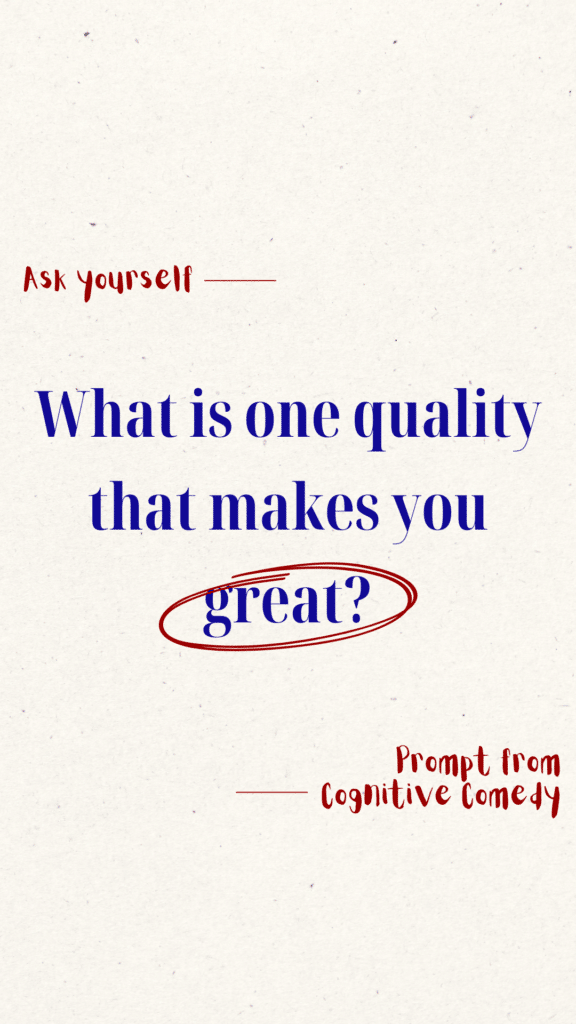By Meghan McCarthy
What is one quality that makes you great?
For many, this question can be a difficult to answer. Traditional societal values often discourage openly complimenting oneself in public. Yet, Jean Haskell, facilitator of the Penn Memory Center’s Cognitive Comedy class, often begins sessions by posing this very question.
As I observed a fall class, I was struck by the ease and comfort with which participants responded.
“I try to be kind,” one participant said.
“I work out every other day,” another shared.
“I am great because of my wife,” a third added.
This seemingly simple question revealed a profound impact. It’s a question we might all benefit from asking more often.
Virtual Programming: Expanding Accessibility
For several years, the Penn Memory Center (PMC) has proudly offered a virtual Cognitive Comedy class series. This innovative program provides cognitive stimulation, emotional uplift, and a sense of belonging to participants and their care partners.
When the COVID-19 pandemic disrupted in-person gatherings, Haskell and Meg Kalafsky, MHCI, associate director of Social Programs, faced the challenge of adapting the program to a virtual format. Instead of canceling, they saw an opportunity.
While laughter is universal, accessibility to in-person classes is not—particularly for those navigating the mobility, transportation, or health challenges associated with Alzheimer’s disease and related dementias (ADRDs). Moving to a virtual format removed these barriers, allowing participants to join from the comfort of their own spaces.
“We had one person who took part from his bed,” Haskell explained. “He had difficulty getting up, but was eager to participate.”
The virtual platform has not only made the program more accessible but also fostered inclusivity, connecting individuals from diverse locations and backgrounds. For caregivers, remote participation reduces the logistical stress of transportation, creating a shared joyful experience.
A Peek Inside the Cognitive Comedy Class
Haskell structures the class with a thoughtful balance of spontaneity and guided activities, engaging participants with varying cognitive abilities. I had the privilege of observing one session this fall, and within minutes, it was clear that Haskell had cultivated an atmosphere of friendship and comfort.
Classes typically begin with warm-up exercises that spark creativity and conversation, such as the prompt: “What are you good at?”
During the hour-and-a-half session, Haskell leads participants through imaginative such as pretending, storytelling, and singing. In one session, participants imagined themselves as bank robbers or visiting a zoo together. Another activity involved pretending to throw a ball while saying each other’s names.
“Rhyming is a favorite,” Haskell explained with a laugh. “I know a guy whose name is Bill. Bill lives on top of a… hill, for example. They really do have fun with it.”
In a game called “Hitchhiker,” one participant offered me a ride—with the condition that we stop at Dunkin’ Donuts first.
The activities are intentionally diverse and inclusive, ensuring that all participants, regardless of their cognitive abilities, can engage and enjoy. Whether a participant loves to tell stories or prefers to listen, there’s a space for everyone. As opposed to traditional improvisation with role play, Jean designs the class in a “pretend” format.
Joy That Resonates Beyond the Screen
Camaraderie lies at the heart of this program. While cognitive enrichment is a significant aspect of the class, Haskell’s primary goal is to foster social bonds among participants.
Cognitive Comedy leverages the power of laughter to foster meaningful connections and enhance the quality of life for participants. You don’t need to know how to tell jokes, or even participate in a joke, for example. It’s ok, and encouraged, to simply come as you are.
“We hope that Cognitive Comedy is a space for people experiencing changes in their memory or thinking to put aside the grief and stress that can come with these diagnoses; instead spending time on a weekly basis connecting, laughing with others, and bringing some joy into their lives,” Kalafsky said.
As the class concluded, Haskell posed another open-ended question: “What is one compliment you can give everyone?”
The responses were as warm and uplifting as the laughter shared throughout the session, underscoring the profound impact of joy, connection, and a simple question.
The Winter/Spring 2025 Cognitive Comedy Series begins on January 21 through March 25 at 1:30 p.m. For more information, please click here.
To read additional coverage on Cognitive Comedy, please click here.

